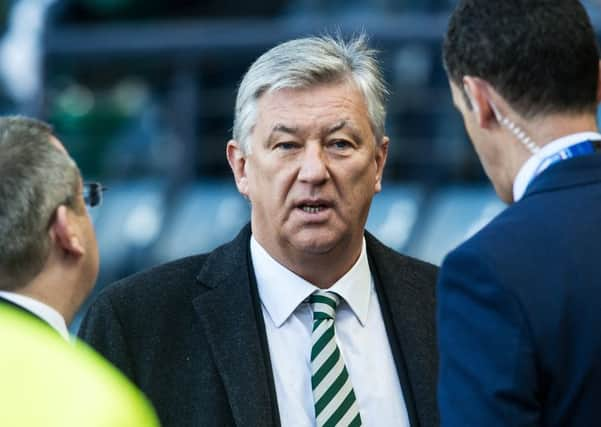Celtic lobby Uefa over Champions League shutout


Peter Lawwell, the Scottish champions’ chief-executive, teamed up with his counterparts from Ajax, PSV Eindhoven and Anderlecht to travel to Switzerland last week to speak with Uefa’s powerbrokers about their fears over the new Champions League plans.
From August 2018, the group stage will be dominated by an elite cartel as England, Spain, Germany and Italy are given half of the 32 places on offer.
Advertisement
Hide AdAdvertisement
Hide AdHowever, Lawwell’s lobby group have told Uefa that it risks damaging football finances across the rest of the continent if the Champions League stays on its new path.
The anxiety is alreadybeing felt in the boardrooms of top clubs in the Netherlands and Belgium, with Dutch media yesterday leaking the disquiet of Ajax.
It seems, though, that Ajax, PSV, Anderlecht and Celtic are speaking on behalf of a larger group of clubs from Europe’s less-wealthy leagues.
The quartet met last week at Uefa’s headquarters in Switzerland with its secretary general, Theodore Theodiridis, and Champions League executive, Giorgio Marchetti. They told Uefa they want to see the Champions League group stage expanded to 48 clubs.
The Uefa executives were told that the new Champions League format would see “a collapse of Europe’s football eco-system”, according to respected Dutch newspaper Voetbal International.
Lawwell’s lobby group stated television contracts in the smaller countries have collapsed in recent years, while broadcasting deals in the richest leagues have exploded.
The quartet argued that an expanded Champions League might be less attractive in drawing television audiences in the top countries, but would boost TV deals in the smaller ones.
Television money is at the core of the Champions League changes. The English Premier League’s new £9 billion television deal was the catalyst for other major European leagues to force a revamp of the competition last August.
Advertisement
Hide AdAdvertisement
Hide AdThe top teams, led by European Clubs Association chairman and Bayern Munich chief-executive, Karl-Heinz Rummenigge, threatened a walkout if changes didn’t go through. They want a 24-team event, with 16 of those spaces guaranteed for the top four leagues.
At a Uefa meeting in Monaco last August, Lawwell was able to persuade the governing body to keep the ‘Champions Route’ for qualification purposes.
This gives the Scottish Premiership champions a lifeline into the wealthy competition, ensuring Scotland’s champions would not face a top-two club from leagues ranked five to ten in the qualifiers.
Uefa has made changes to the co-efficient system which means clubs are now judged on their own record rather than the national league co-efficient, from which the Scotland’s top-flight has made minimal contribution recently due to poor results. The other significant change was the recognition of historical success in the competition, meaning Celtic’s European Cup win in 1967 retains modern-day value for the club in terms of co-efficient points.
Lawwell said when the changes took place last August: “This decision affects all European football and we just hope what’s done now and in the future will benefit every European club.”
Ajax, PSV, Anderlecht and Celtic were taken by surprise when Uefa bought off the elite’s push for a Super League by agreeing to the new changes, timed to kick in when the new Champions League television contracts starts in 2018.
The quartet did not want to be surprised again, which is why they have decided to be pro-active and push for an expansion of the group-stage format.
Ajax have also told Uefa it should conduct a proper review of the rival scenarios before making a decision.